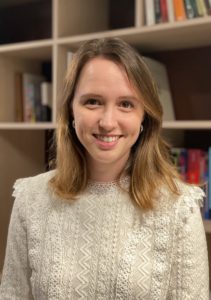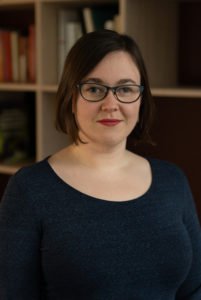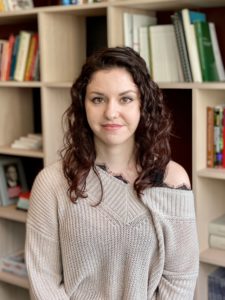PhD defence: Issam Maarouf
Trial Lecture: Coding for Flash Memories: State-of-the-art and Challenges
Celebrating International Women’s Day – 8th March 2023
On the occasion of International Women’s Day and this year’s theme “DigitALL: Innovation and technology for gender equality” we have talked with three of our female researchers to celebrate women’s contributions to the field and promote more diversity and inclusivity.
For the sixty-seventh session of the Commission on the Status of Women this year’s priority theme is “Innovation and technological change, and education in the digital age for achieving gender equality and the empowerment of all women and girls” (unwomen.org). The UN Women Gender snapshot report for 2022 shows that globally, women make up just 19.9% of science and engineering professionals.
In the Simula group overall, we actively strive to better balance the proportion of men and women in ICT research. By 2028 Simula aims to have 40 per cent of the workforce filled by women.
It is also important to raise awareness around the contributions that women are making to the field today. We have interviewed three of our female researchers on the work that they are doing and their thoughts on this year’s theme. From the department of cryptography: PhD student Irati Manterola Ayala and Postdoctoral Fellow Martha Norberg Hovd. From the Department of Information Theory Postdoctoral Fellow Maiara Bollauf.
Mathematics in the real world
Irati Manterola Ayala did her bachelor in pure mathematics in Spain (UPV/EHU), with an exchange to Denmark (AU) in her last year. Afterwards, she continued her studies in pure mathematics with a master in Switzerland (UZH), while doing her master thesis on exchange in the Netherlands (LU).
What scientific field are you working within, and what inspired you to pursue a career within that field?
- I am currently a PhD student in cryptography. After finishing my master, I realised that I did not want to continue within pure mathematics, as it became increasingly abstract and disconnected from the “real world”. Instead, I wanted to work within a more applied field where I could still use my mathematical knowledge, and working in cryptography seemed like a good fit for me.
What are you working on right now?
- I work in post-quantum cryptography, which is the field within cryptography that works on schemes that are resistant to attacks from future quantum computers (and classical computers). In my case that means that I analyse proposed schemes, that claim to be safe against quantum computers, and try to find vulnerabilities in them.
What is a typical working day like for you?
- I like to get to work early so I can work in the morning. My work typically consists of reading up on articles, working on a paper by writing or solving a problem, or programming. On top of that, I regularly have meetings since most of my work is in collaboration with other people, and we have occasional gatherings where we watch and discuss relevant conference talks together. In between my work, there is a break at lunchtime and a second break later in the afternoon for coffee to relax and talk with coworkers.
Making sure communication is secure and reliable
 Maiara Francine Bollauf got her bachelor’s in Mathematics from the State University of Santa Catarina, Brazil (2012). Both her master’s and PhD degrees are in Applied Mathematics from the University of Campinas, Brazil, in 2015 and 2018, respectively. During her PhD, she did a six months research internship at the City University of New York (2016), and before joining Simula UiB, she was a postdoctoral associate researcher at Texas A&M University at Qatar (2018-2019).
Maiara Francine Bollauf got her bachelor’s in Mathematics from the State University of Santa Catarina, Brazil (2012). Both her master’s and PhD degrees are in Applied Mathematics from the University of Campinas, Brazil, in 2015 and 2018, respectively. During her PhD, she did a six months research internship at the City University of New York (2016), and before joining Simula UiB, she was a postdoctoral associate researcher at Texas A&M University at Qatar (2018-2019).
What scientific field are you working within, and what inspired you to pursue a career within that field?
- My research field is Applied Mathematics, with emphasis in Coding Theory. In more specific terms I work with lattices, which are an algebraic structure, and their applications to secure communications. I am always proud to say that my career choices were inspired by several women. I decided to do a bachelor in Mathematics because of a (female) high school teacher, who was always challenging me to solve exciting math problems. During my undergraduate studies, a (female) Professor showed me how fascinating algebra could be and encouraged me to follow the academic career. Finally, in the first year of my Master’s, I got into the lattice world after attending a seminar from a (female) Professor, which soon became my supervisor.
What are you working on right now?
- I work with designing lattices to guarantee that, when two (or more) people are communicating through a noisy channel or storing their data in the cloud, for example, that process is secure and reliable. The area that best describes my research contributions is Coding Theory, but I am also considering new directions of my research in Cryptography, since lattices are being widely used in such area nowadays.
What is a typical working day like for you?
- In my point of view, that is the best part of an academic job: there is no such thing as a typical working day. Every day is different and unexpected. Truth be told: I do have a list of things that I am supposed to do, tasks I am expected to perform, and meetings to attend, but the outcomes are always a surprise. You can succeed in demonstrating a result you were trying to prove for days, or be frustrated for adding one extra day to the counting. As someone that is highly motivated by challenges, I see this as a very positive side of academia.
Do you have any advice for other women wanting to pursue a research career (in STEM/tech)?
- Persist. If you are in a position where you already have the will to pursue a research career in STEM, I believe you are halfway there. Research requires resilience and persistence, and doing something that you like helps to keep the motivation. There will be moments when you will question your choices, but keep in mind that all careers have their pluses and minuses, and the pluses from academia can be quite rewarding.
From comparative literature and physics to cryptography: find what interests you

Martha Norberg Hovd did one bachelor in physics and another one in comparative literature as well as a master’s degree in mathematics, all from NTNU in Trondheim. Then she moved to Bergen in 2018 to do her PhD in cryptography, which she finished in March 2022.
What scientific field are you working within, and what inspired you to pursue a career within that field?
- When I was studying physics, I also did a lot of subjects completely unrelated to physics, and one of them was a pure cryptography course which was by far the most fun course I had ever had. It made me decide to do a master in mathematics rather than physics so I could learn more, and I felt like there was still so much to learn and explore after I finished the degree, so when I got the opportunity to do a PhD in cryptography I very quickly jumped on it because it seemed like the dream job: getting paid to learn more about something I thought (and still think) is really fascinating.
What do you consider your expertise?
- Although I’ve worked on different things in both my PhD and now as a post.doc., it’s safe to say that my main expertise is the security of fully homomorphic encryption schemes.
What do you consider your biggest achievements?
- In addition to doing a PhD (without working myself completely to death), I also consider being able to combine my interest of science, mathematics and literature throughout my studies as a great accomplishment.
What is it like working as a woman in a field that is so overrepresented by men?
- I’m personally in a working environment where I feel respected and appreciated as a researcher, colleague, and a human being, but I think it’s important to acknowledge that this isn’t the case for everyone in the field, as misogyny and sexism still very much exist, both in STEM and society in general.
Do you have any advice for other women wanting to pursue a research career (in STEM/tech)?
- First and foremost: I’d advise anyone, regardless of gender, who wants to pursue a research career to find something they really think is interesting, because trying to find motivation to work on something that doesn’t interest you is just terrible. Also, as a general advice, do research with people you respect, and who respect you back. However, research shows that female students in STEM are much more prone to imposter syndrome than their male co-students, so I would especially encourage women to be mindful of this. If you feel that you’re not smart enough for something, actively look for evidence to the contrary, get a second or third opinion, and talk about it with people you feel comfortable with.
